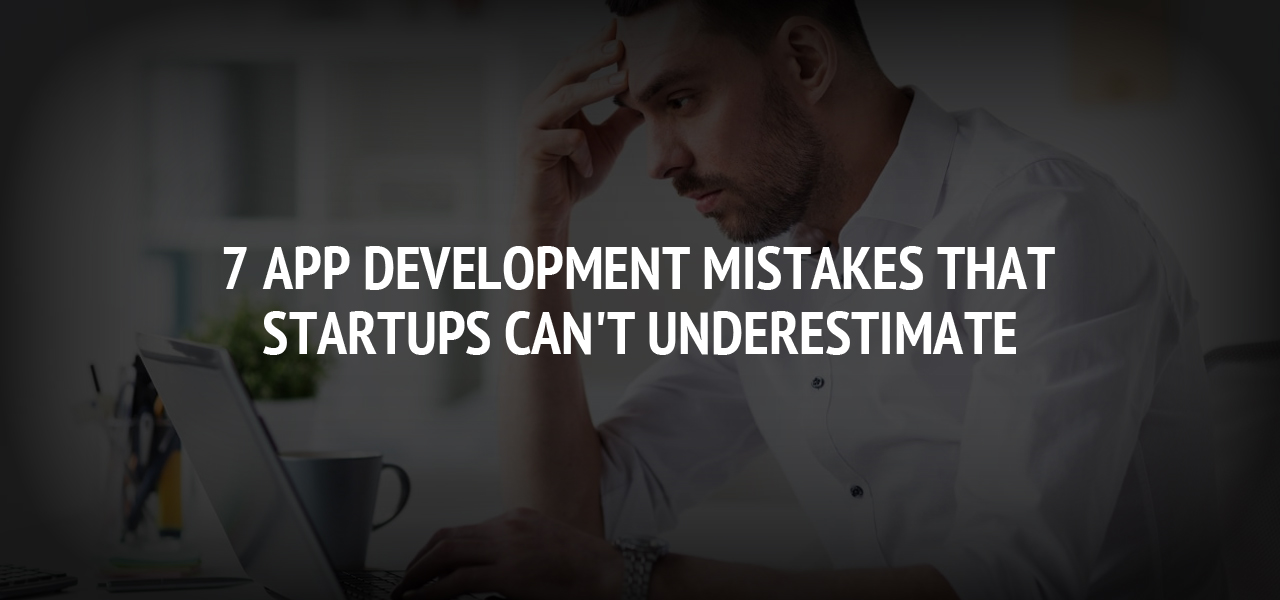7 App Development Mistakes That Startups Can't Underestimate

Most startups today are investing in mobile apps to help their businesses get off the ground. By late 2018, the two leading app store had over 2 million apps ready for download. However, it does not mean that all these apps return a profit to all the businesses. This idea can be highly rewarding, as it aims at both generating revenues for the business and to market their services or goods. On the downside, starting a mobile app can have devastating consequences for the startup killing it before it develops to anything significant. This article covers 7 app development mistakes that a startup business will do in the app development process that may end up destroying their business.
Mistake #1. Creating An App Just For The Sake Of Having One
Just because all other companies have apps, it does not mean that you should get one for yours. If the mobile app does not have any advantage to the end user, then it is doomed to fail, resulting in wastage of money and time. Before making the decision on whether or not you need an app for your business, consider the goal you are targeting and the direction you want your business to follow. If you having trouble with the vision for your business, use the rule of" how, why and what," by Simon Sinek to give you guidance.
Mistake #2. Hiring Inexperienced Personnel To Build The Application
Developing an application is expensive. You will want to hire an expert in this sector, who will build your application in the shortest time possible and at your budget. Unfortunately, most businesses do not have prior knowledge of whom to trust to create their applications. This means that they get applications that do not work well with the platform meant for it. They would then have to part with some more money to hire another developer who would probably still create another a bad application. And all this without forgetting that they have to market it again.
It is important to conduct a background check on the person you are hiring for this endeavor. A good app developer would be the one who has experience with a similar application. Then to avoid unnecessary expenses possible fraudster, take time to understand the process of creating the application, so that you pay just enough, not more than required. Before starting your app development, you should advance your research to complete tasks quickly and efficiently.
Mistake #3. Failure To Market The Application Before Launching It
According to insights, 42% of businesses fail because the market they are target ting does not need their products. It is important to get some spotlight on your app before launching it so that you can plan accordingly on how to make it appeal to your audience.
Your market research should focus on this major point:
- What is your competition?
- What are their strong points and what makes them appealing to their audience?
- Can you do something better to make your app more appealing?
- Do you still have issues about your application that you need to solve?
- Is your application solving the problem that prompted its development?
To get fulfilled your you business goal you need more appealing app marketing strategies. So you must analyze and study your solutions carefully, before taking the next step.
Mistake #4. Neglecting To Secure The App From Hackers
When an application starts to gain popularity, it is bound to be a target to hackers. The client's information should be secure at any cost if you want to stay in business. Hackers will target any app for several reasons, it does not matter whether the issues are sensitive or not. Possibilities that you may get hacked should be enough reason to have security for your app. The messages that go through the app should use AES/SSL/TLS encryption to secure them. Having a secure platform creates confidence among your clients and as well as secures your earnings from the business.
Mistake #5. Neglecting Bandwidth Optimization
Some startup tends to come up with an app that requires a powerful connection to operate optimally. The problem with this is that it is costly to the consumer. A consumer will spend more money to get a stronger bandwidth in order to use the app. Such situations will push away the app users since the majority of people cannot afford to keep up with these expenses. Maybe only a few will remain, but with the diminishing popularity, the business will end up failing.
It is therefore appropriate that the app should focus on bringing the service to people at a convenient bandwidth. Invest in a bandwidth that can be accessed by most consumers to get optimum results.
Mistake #6. Overcomplicating The User Interface
The user interface in your app should be simplistic as much as user-friendly. Some start-ups tend to come up with overly designed apps, including some useless functions and menus, with the intention of standing out from the competition. These design features tend to put off customers because they have to go through a learning process to understand how it works.
Make sure that your application does not require some lengthy tutorials to understand how it works. Users should open the app without any hassle and start to use it instantly. Each button should have a clear purpose and conveniently place in the application. Some of the things that will give an app a positive review by users are:
- Fast loading screens
- Add free applications
- Easy registration process
Mistake #7. User Experience
75% of users never use the app after a first time experience. Meaning that if you do not come up with an app that catches the user's attention, they would probably never use it again. To ensure that this does not happen, you will need to create a plan for after download engagement so that you are in constant connection to the app users. You can do this including real-time updates and notifications. The notifications should remind the user that the app is still there and that it is ready to perform the intended task, even if it is not open. This interaction will attract users to open the app.
Starting a business can be difficult, especially when you do not have any prior knowledge on how to reach your intended market. The internet has become the place to go when you want to reach audiences, so it is reasonable to have an app that is personalized to your business to help you reach this audience. However, the approach should be calculated. Starting an up does not mean that it will reach everyone. Start your business by avoiding the above mention app development mistakes and you are sure to be fine.
About The Author
Related Blog
View All-
Best Android Cleaner Apps for Optimizing Your Phone in 2023
Android is a popular operating system and Android smartphones are highly used across the globe. It is supported by the Google Play Store which offers a huge pool of Android apps. We install and use multiple apps and eventually end up cluttering our devices. The ...
-
What to Do With Your Old iPhones?
We all know someone who is a die-hard fan of Apple. If you do not know someone like that then you might be that guy. Any Apple fan is bound to have a drawer in their home that is filled with old Apple products. You might have a lineup of old iPhones lying around ...







